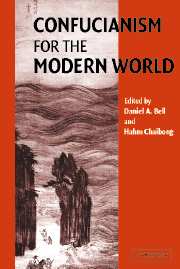Book contents
- Frontmatter
- Contents
- List of Contributing Authors
- Acknowledgments
- Editors' Note
- Introduction: The Contemporary Relevance of Confucianism
- PART I CONFUCIAN PERSPECTIVES ON DEMOCRACY
- PART II CONFUCIAN PERSPECTIVES ON CAPITALISM
- 7 Center-local Relations: Can Confucianism Boost Decentralization and Regionalism?
- 8 Affective Networks and Modernity: The Case of Korea
- 9 Confucian Constraints on Property Rights
- 10 Giving Priority to the Worst Off: A Confucian Perspective on Social Welfare
- PART III CONFUCIAN PERSPECTIVES ON LAW
- Epilogue: Why Confucius Now?
- Index
7 - Center-local Relations: Can Confucianism Boost Decentralization and Regionalism?
Published online by Cambridge University Press: 28 August 2009
- Frontmatter
- Contents
- List of Contributing Authors
- Acknowledgments
- Editors' Note
- Introduction: The Contemporary Relevance of Confucianism
- PART I CONFUCIAN PERSPECTIVES ON DEMOCRACY
- PART II CONFUCIAN PERSPECTIVES ON CAPITALISM
- 7 Center-local Relations: Can Confucianism Boost Decentralization and Regionalism?
- 8 Affective Networks and Modernity: The Case of Korea
- 9 Confucian Constraints on Property Rights
- 10 Giving Priority to the Worst Off: A Confucian Perspective on Social Welfare
- PART III CONFUCIAN PERSPECTIVES ON LAW
- Epilogue: Why Confucius Now?
- Index
Summary
Debates about the revival of Confucianism over the past two decades stem from at least four causes: 1) a sense of spiritual vacuum in East Asian societies, and the claim that the individual and community can regain their moorings; 2) a rise in nationalism and regime survival strategies backed by the claim that strong states are justified by tradition; 3) resistance to globalization and the spread of Western culture in a dynamic region which believes that its economic success should be matched by cultural success; and 4) a response to increasing economic integration within East Asia to create a more stable foundation for regionalism within a context of globalization. Diverse strands in the Confucian tradition are used to buttress different claims. The most basic split is between those with a rearguard mission to use group orientation, community responsibility, and nationalism to resist globalization, and forward-looking voices who draw on the past as well as the realities of our changing world to shape the process of globalization through a cosmopolitan self, heterogeneous communities, and open regionalism. The former equate Confucian traditions with centralization or with strict control through groups working closely with the center, while the latter, after a century of nationalism, are struggling to reaffirm the decentralized roots of the tradition.
This essay champions the idea that by finding positive messages in the history of their region the peoples of East Asia can ease their transition into the twenty-first century.
- Type
- Chapter
- Information
- Confucianism for the Modern World , pp. 181 - 200Publisher: Cambridge University PressPrint publication year: 2003



